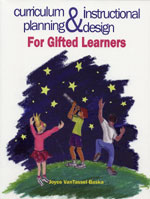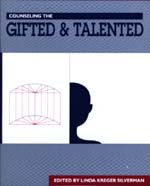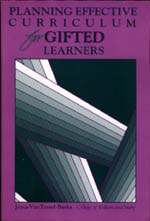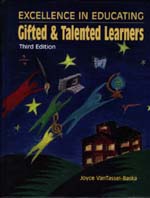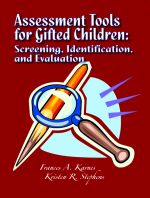| Joyce VanTassel-Baska, College of William and Mary
This comprehensive edition is packed with ideas for effective curriculum and instruction of talented learners.
You'll find it covers personality, learners with disabilities, learning styles, and also stages of giftedness from infancy all the way to adulthood. It not only gives the characteristics and needs, but talks about grouping and acceleration and offers a comprehensive model of program development. Special attention is given to mathematics, science, social studies, and the humanities.
Special Features
- Interweaves the characteristics of the gifted with program development and curriculum
- Explores thinking skills and creativity
- Covers both cognitive and affective needs
Contents
Part One: Focus on Individual and Group Differences
1. Introduction
2. Conceptions of Intelligence
3. Personality and Learning Styles of Gifted Children
4. Giftedness in Early Childhood
5. Underachieving and Talented Learners with Disabilities
6. Disadvantaged Learners with Talent
7. The Highly Gifted
8. Girls of Promise
9. Development Stages of Giftedness
Part Two: Serving Talented Learners in Special Programs
10. Characteristics and Needs of Talented Learners
11. Identification and Assessment of Talented Learners
12. Programs and Services at the Elementary Level
13. Programs and Services at the Secondary Level
14. Key Issues and Problems in Secondary Programming
15. Grouping Intellectually Advanced Students for Instruction
16. Acceleration as a Method for Meeting the Academic Needs of Intellectually Talented Children
17. Evaluating Programs for the Gifted
18. A Comprehensive Model of Program Development
Part Three: Providing Effective Curriculum and Instruction for Gifted & Talented Learners
19. Appropriate Curriculum for the Talented Learner
20. Strategies and Methods for Teaching the Talented
21. Creativity and the Gifted
22. Thinking Skills for the Gifted
23. Mathematics and Science
24. Social Studies and Language Arts
25. Arts and Humanities
Part Four: Helping the Gifted and Talented Achieve Excellence
26. Facilitators for Talented Students
27. Counseling Talented Learners
28. Excellence as a Standard for All Education
544 pages
1998/hardback/paperback edition 2007/ISBN 978-0-89108-330-6
$78.00 |

